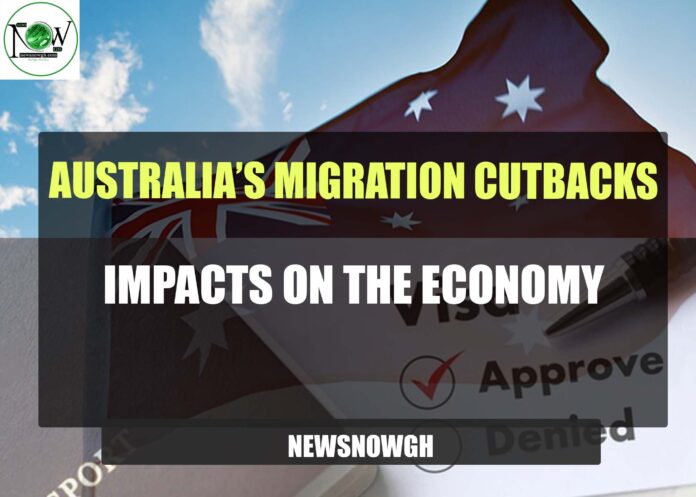Australia’s Migration Cutbacks: Impacts on the Economy
To counteract rising inflation, which peaked at 4% in June 2024 for six months, Australia intends to increase net migration to 260,000 by June 2025. Although the goal of this reduction is to lessen the strain on the labor market and high rental costs, many are dubious about how well it would control inflation.
Impacts on the Real Estate Market
Economists think that less migration can ease the pressure on renters. It is anticipated that the decline in net migration will stabilize the housing market and reduce the current housing crisis.
Tighter Visa Requirements
Stricter visa regulations have been implemented by the government, which mostly affects international students, who account for half of net migration. To reduce the number of international students and help the housing shortage, this includes a 125% rise in application costs.
Uncertainty About Diverse Economic Effects
There are worries about the detrimental effects on productivity and economic growth, even though the decrease in migration is thought to help control demand and inflation. Overall, the impact on inflation is still unclear, and more research and modifications are expected.
Australia Refusing More Student Visa Applications Than Ever
Since the cost of a student visa increased to $1,600, Australia is turning away more applications. This section examines the effects of the visa fee hike on Australia’s student population. The education sector is divided and deeply troubled by Australia’s move to more than quadruple the application fee for overseas student visas.
Visa Fee Surge: An immediate financial hardship on students
The cost of an international student visa has increased to $1,600 from $710 Australian. This sharp rise is intended to control immigration and finance much-needed school system improvements.
Comparative Price Comparison: Australia’s Position
Australia’s new visa charge now outweighs its rivals in the international education sector by a considerable margin. For example, the cost of a student visa in the US is about $185, but in Canada, it costs about $150 Canadian
The University Sector Backlash
Leading research universities in Australia, such as the Universities of Sydney and Melbourne, have strongly opposed the fee increase. They contend that the action will discourage qualified candidates and reduce cultural diversity on campuses, possibly resulting in losses for the industry.
Government Policy Shift’s Impact on Applications
Concerns among the education community have been exacerbated by recent government initiatives, such as measures to cap the number of international students and tighten English language proficiency requirements.
Australian Government Evaluating the Approach
Mixed Reactions and Uncertainty
The government wants to control immigration levels in light of property market pressures, but some see the price increase as a blunt tool that could damage Australia’s standing as a friendly country for international students.
What’s the Future Considerations
The industry awaits clarification on the details of these caps and their possible ramifications as legislation changes pass through Parliament and investigations.
Australian Government Exploring Alternatives
A more nuanced approach to striking a balance between migration management and economic advantages could be provided by alternative measures, such as targeted Visa extensions in areas experiencing housing shortages, in the face of persistent uncertainties.
Conclusion: Navigating change in Australia’s education landscape
The consequences for Australia’s international student sector are still significant as it navigates these developments. Finding a balance between protecting the economic and cultural contributions of overseas students and maintaining migratory integrity is a problem.
Follow us on Newsnowgh.com to stay updated on the latest information regarding work permits, visa application processes, paths to permanent residency, and visa-sponsored employment.


